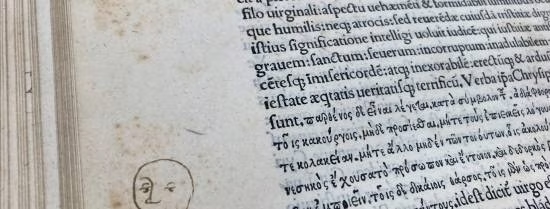The Erasmus of Rotterdam Research Centre (ERRC) regularly organizes the so-called Erasmus Seminars, where we bring together academics who have an interest in Erasmus from their research. The content of the seminars is diverse, from discussions on recent publications to extensive lectures. On behalf of the ERRC, we cordially invite you to the upcoming seminar on Thursday, November 21st. During this meeting Evi Zacharia (Erasmus Collection Fellow) will discuss the affinities between the Concept of Deification in St Jerome and the Concept of philosophia Christi in Erasmus.

What? Erasmus Seminar with a lecture by Evi Zacharia
When? Thursday, November 21st, 15:00-17:00
Where? Erasmus University Rotterdam, Mandeville T3-32.
Zoom: https://eur-nl.zoom.us/j/67271410139
Abstract
St Jerome (ca. 346-420) is known not only as the father of the Latin Bible, the Vulgate, but also as an avid expert of Latin, Greek, Hebrew and ecclesiastical literature. Even if Jerome never refer explicitly to the notion of deification in his works, however, in his Epistles, Tractates on the Psalms and Adversus Iovinianum, he uses complementary terms (adoptive sonship, participation in divine life, and human freedom) to express his understanding of deification. These terms, some of them rooted in Pauline tradition, underline the Christological, sacramental, and moral dimensions of deification. Desiderius Erasmus (1466/1467/1469-1566) is one of the most influential thinkers of The Netherlands. During the height of his fame and his greatest productivity (1515-1519) and by using different literary and scholarly styles and genres (biblical exegesis, satire, translations of Christian Fathers, treatises on various aspects of education, etc.), Erasmus spreads his concept of philosophia Christi, a concept with ethical and social critical implications, but most importantly with Christian humanistic purposes. In particular, Erasmus developed in his concept of philosophia Christi the two pillars of the process of perfection: Christ (incarnated as logos) and man’s nature which seeks to perfection.
The primary aim of this seminar is to argue that even if the doctrine of deification is not mentioned explicitly by St Jerome, it shares several affinities with the concept of Erasmus’ philosophia Christi. The first part of the seminar is dedicated to Erasmus’ patristic sources (Ambrose and Augustine) and their role for shaping his philosophia Christi. I then treat themes of ‘deification’ which imply indirectly the union between God and the human being in Erasmus’ Adagia, Enchiridion, Paraphrases, Ciceronianus, and Convivium religiosum. In the last part, I compare these motifs both in St Jerome and Erasmus while I demonstrate that the philosophia Christi was in essence a description of the method of human perfection.
Bio
Evi Zacharia is an enthusiastic, multilingual and career-minded PhD student, teacher and researcher with in-depth knowledge in the field of Philosophy. Teaching experience spans 9 years and includes classroom instruction and private tutoring to undergraduate & postgraduate students of Philosophy (ancient-medieval-modern) . Research interests: Metaphysics of Love (Existentialism & Idealism), German Idealism, Russian Philosophy (19th century), Ancient Greek Philosophy (Neoplatonism), Philosophy of Religion (mysticism).
